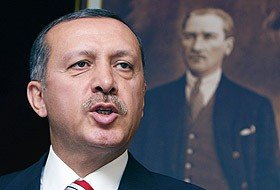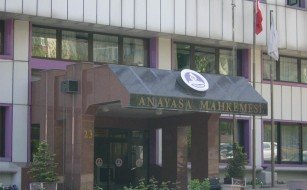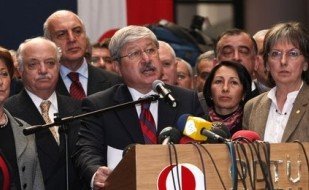At a symposium in Kayseri, central Anatolia, Yusuf Halacoglu, president of the Turkish Historical Society (TTK) had made comments on the ethnic composition of Turkey which have caused enraged reactions.
Halacoglu had claimed that "People we call Kurds are actually of Turkmen origin, while those we think are Kurdish Alevi are really of Armenian origin". He put forward the claim that "most of the people in the TIKKO (Turkey Workers' and Villagers' Liberation Army) and PKK (Kurdistan Workers' Party) organisations are Kurds of Armenian origin."
Maksudyan: 'Race' is an outdated concept
Nazan Maksudyan, author of the book "Measuring Turkishness: Science Fiction Anthropology and Turkish Nationalism's Racist Aspect (1925-1939) and history PhD candidate at Sabanci University, has commented:
"It is impossible to read Halacoglu's comments without feeling alarmed. It has long been accepted by scientists that the concept of 'race' has no scientific base. Categorising people as Armenian, Kurdish, Turkmen and ascribing certain characteristics to these groups and assuming that they behave in a certain way is at best a simplification, but at its worst racism."
"Race" is an exclusionary category
"We know that in the foundation years of the Turkish Republic, racism was one of the currencies affected by the nationalist paradigm and that there were serious references to the 'Turkish race' when the national history and national language theses were formulated. There was research done in the name of anthropology which was far from scientific, and the superiority of the 'Turkish race', designated as the founders of the state, was continuously emphasised. 'Race', unlike 'culture' or 'citizenship' is a category that does not allow for later membership. Its points of reference are blood, lineage and roots, which are exclusionary and result in second-class citizenship."
Maksudyan continued, "By claiming that Kurdish Alevis are really Armenians, Halacoglu has also referred to a touchstone of today's nationalism: the denial of the 1915 disaster: The Armenians did not die, they are alive with an Alevi identity."
Association of Armenians with terrorist activities
"In addition, the association of 'Armenian origin' with 'terrorist organisations' is a frequently encountered example of racism. Armenians in this country, whether 'converted' or not, are targeted as suspicious at any opportunity anyway. Is it not clear that such statements, instead of reducing the prejudice and hostility of the public, foment hatred?"
Maksudyan ends with a question: "Did we not see with Hrant Dink's murder in January that such 'disclosures' provoke people, even punish someone?"
IHD and Alevis call for resignation
Meanwhile, the Human Rights Association (IHD) and the Alevi Pir Sultan Abdal Culture Association have reacted to Halacoglu's statements.
The IHD has said that Halacoglu, by ignoring the ethnic roots of the people living in Turkey, has displayed a racist attitude and has called for his resignation. As the president of the TTK, it should have been Halacoglu's duty to avoid racism and other prejudices. Since he has been in the office, the IHD claims, he has abused it in order to shape history according to his own ideas. The association will send Prime Minister Erdogan a letter to call for Halacoglu's dismissal.
Office carries responsibility of neutrality
The Pir Sultan Abdal Culture Association has denounced his stance as "an act of hostility towards science" and has also called for his resignation: "With his comments on Alevi culture and beliefs and Kurdish identity, Halacoglu has committed the crime of separatism in the face of Turkey's reality." The association pointed out that his office carried the responsibility of objectivity:
"When one looks at the formation of this institution and its research since then, it is clear that the TTK has been given a mission. Since the 12 September 1980 military coup, its studies have been far from scientific. It is not the duty of scientists to interpret history in the framework of written laws and to agree with official ideology, but to defend the truths of scientific history in the framework of universal law." (ASB/NZ/GG/AG)







